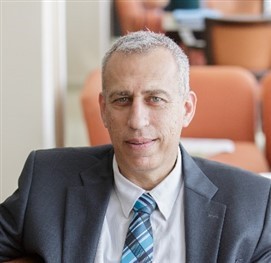As part of our #SmartHealthSystems study which examines the digital transformation of healthcare systems in 17 countries, we have visited five of these countries to take a closer look at what they have achieved. In each country, we have explored the political, cultural, technological and economic factors driving success as well the obstacles to advancing digitization strategies in healthcare. The findings of our cross-national study will be published in November 2018. Until then, we will be highlighting thought-provoking insights and best practices from other countries here in our blog.
Israel has considerable innovative power when it comes to implementing digital solutions for healthcare delivery. Israeli Health Maintenance Organizations such as Maccabi are at the forefront of implementing digital health. Prof. Nachman Ash and Dr. Rachelle Kaye tell us in an interview what digital services are available in the Maccabi system for patients and health professionals. They emphasize digital access to health information must be user-friendly and trustworthy. Patients must be able to see for themselves that a trusted professional enters their medical information into electronic health records. For the future, they predict more patient empowerment by using patient reported data and the integration of digital health services with easy to access messaging services.
Why did Maccabi develop digital solutions for healthcare delivery?
“Maccabi was one of the first healthcare organizations internationally to begin to computerize its administrative and clinical systems and one of the first to implement an organization-wide electronic medical record. This implementation process began in 1984 and by 1994, all Maccabi affiliated physicians were using the Maccabi electronic medical record. Maccabi embarked upon this journey because it recognized that with the rapid developments in modern healthcare, the explosion in medical knowledge, and the increasing complexities of organizational management, computerization and clinical decision support was a necessity. Its major objective at the beginning was to develop digital solutions to support the clinicians and consequently, as it computerized its medication prescribing, its imaging services, its laboratories, all were integrated with the electronic medical record so that the clinician had all of the information at his fingertips in real time to support his decisions. In 2001, this vision was extended to the Maccabi members, who always are viewed to be at the centre of the healthcare delivery process: We created Maccabi online, Maccabi’s patient portal, giving the patient access to their medical information and other online services.”
What kind of digital services have made it into regular healthcare delivery at Maccabi for patients?
“There is a wide array of services available to patients, such as the Maccabi Online patient portal. The portal enables patients to access their medical information, to make appointments, receive tailored recommendations for prevention and early detection, as well as recommendations and reminders for chronic care management. The portal provides patient access to virtual visits with the doctor including requesting and receiving prescriptions, referrals and messaging. Patients also have the possibility to receive treatment remotely through telemedicine including teledermatology and tele-ultrasound. Patients hence can receive an expert interpretation by doctors. Patients also have mobile access to the portal, with all of the services we just described. The portal also sends out SMS and e-mail reminders for appointments, but also prevention messages such as reminders for flu shots. The Maccabi website provides patients furthermore with access to all information on available services as well as educational information, ongoing updates and interfaces with the Maccabi service directory, and of course, with the patient portal. In addition, patients can order travel insurance as well as receive other online services. Lastly, there are apps available for patients, such as a pregnancy diary, a diet app and most recently “K” – that enables the patient to get guidance by comparing him/her with patients with the same characteristics in the Maccabi database.”
What kind of digital services does Maccabi offer for health professionals?
“Similar to patients, health professionals have many digital services at their disposal. First, a comprehensive central Electronic medical record gives health professionals access to all of the necessary patient information available in the system. The doctor has access to information entered by all clinicians including the patient’s prescribed medication, lab results, other diagnostic test results, and their hospital visits in real time. In addition to that, there is a sophisticated Clinical Decision Support system for prescribing medication, alerts, reminders for diagnostic tests, reminders for prevention, etc. in accordance with the specific patient’s diagnoses, problems and demographics based on the entire database. Furthermore, doctors are supported in managing chronic diseases by using a “Big Data” approach with access to digital medical registries. Moreover, as already mentioned, telemedicine supports physicians in making diagnoses and providing treatment immediately. For example, ECGs are transmitted to an ECG interpretation center, and the interpretation is transmitted back within 10 minutes. Likewise, X-rays are immediately transmitted back to the electronic medical record. And finally doctors have also a mobile access to their patients electronic medical record.”
What are the most “successful” digital applications in healthcare delivery and why?
“Two digital “applications” provide the foundation and infrastructure for all other digital services, both for the healthcare professional and the patient. In that sense they are the most successful digital applications, namely for doctors the comprehensive and integrated Electronic medical record with its Clinical Decision support system, and for patients the Maccabi online service, both including mobile access for doctors and patients respectively.”
Citizens’ trust is crucial when it comes to digital health, how do you build trust?
“Trust in digital health is built by providing stable, secure, and user-friendly digital services. The foundation, however, is based on trust in the organization itself. In regular surveys in Israel, health plans are always on the top of the list as among the most trusted organizations. For example, Maccabi members can see their doctors and other health professionals entering the information during the visit so that they know that the information is entered by a trusted source. They also know that there are measures taken to assure confidentiality and privacy: the patient must give his magnetic card to a professional in order for him to enter his record and the patient can only access his own information using a user name and password.”
What do you think are future developments in the upcoming years for the use digital healthcare in Israel?
“Israel has embarked on the total digitalization of all of its services including healthcare. It has formulated a digital health strategy putting the patient at the center of a participatory care process. However, it is clear that future developments will include new and innovative technologies, such as predictive and personalized care based on Big Data, but also technology-supported integrated care. We will certainly witness more patient empowerment and the creation of patient partnerships in care by using so called PROMs, patient reported data and outcomes. Bots and similar technologies will increase user-friendly access to health information and advice. Easy to use apps, similar to services such as “Whatsapp”, will be integrated with the medical record to support the documentation in the electronic medical record itself of instant messaging between patients and clinicians, and among clinicians. In the area of health promotion and chronic disease management, more apps and wearables for remote monitoring will certainly be available. Last, diagnosis and treatment will become more and more supported by artificial intelligence, whereas health data exchanges, not only limited to electronic health records, will provide an easy access to information for patients and doctors from anywhere anytime.”
 Prof. Nachman Ash, MD MS MA received his MD degree from Sackler School of Medicine, Tel Aviv University in 1986. Between Jan 2012 and July 2013 Prof. Ash served in the Ministry of Health as a senior Deputy Director General for Health Informatics. In August 2013, Prof. Ash joined Maccabi Healthcare Services (MHS) as the chief Director of “Sharon” district. A year later, he was promoted to be the Director of the Health Division of MHS, also serving as Deputy CEO for Health Affairs, a position that he holds currently. Nachman Ash is a Professor at Ariel University.
Prof. Nachman Ash, MD MS MA received his MD degree from Sackler School of Medicine, Tel Aviv University in 1986. Between Jan 2012 and July 2013 Prof. Ash served in the Ministry of Health as a senior Deputy Director General for Health Informatics. In August 2013, Prof. Ash joined Maccabi Healthcare Services (MHS) as the chief Director of “Sharon” district. A year later, he was promoted to be the Director of the Health Division of MHS, also serving as Deputy CEO for Health Affairs, a position that he holds currently. Nachman Ash is a Professor at Ariel University. Rachelle Kaye , PhD is the International Projects Coordinator for Assuta Medical Centers, as well as a member of the core team for implementing digitally enabled integrated care in Assuta Ashdod Hospital, Israel’s newest public, university affiliated general hospital. Dr. Kaye was the Deputy Director of the Medical Department (1984-2003) of Maccabi Healthcare Services. Dr Kaye established The Maccabi Institute for Health Services Research in 2004 and was the Director of the Institute until 2013. Dr. Kaye is a member of the Board of Directors of EHTEL (the European Health Telematics Association) and acts as a consultant to a number of Israeli and European Organizations, particularly in the area of integrated care and eHealth.
Rachelle Kaye , PhD is the International Projects Coordinator for Assuta Medical Centers, as well as a member of the core team for implementing digitally enabled integrated care in Assuta Ashdod Hospital, Israel’s newest public, university affiliated general hospital. Dr. Kaye was the Deputy Director of the Medical Department (1984-2003) of Maccabi Healthcare Services. Dr Kaye established The Maccabi Institute for Health Services Research in 2004 and was the Director of the Institute until 2013. Dr. Kaye is a member of the Board of Directors of EHTEL (the European Health Telematics Association) and acts as a consultant to a number of Israeli and European Organizations, particularly in the area of integrated care and eHealth.
Follow us as we take a closer look at e-health developments in various countries for our study throughout the course of 2018.
We will publish the full results of our international study in November 2018. Until then, we will be highlighting thought-provoking insights and best practices from other countries here in our blog. If you are interested in keeping up-to-date with our latest analyses, we recommend that you sign up for our email newsletter:


